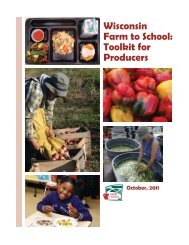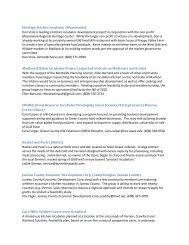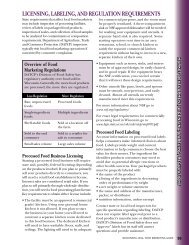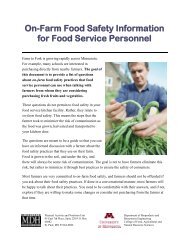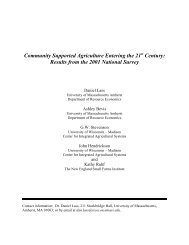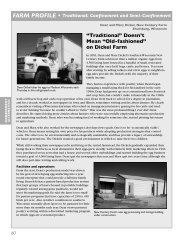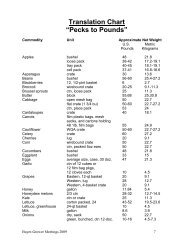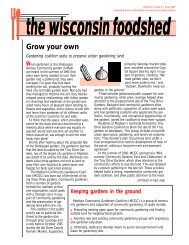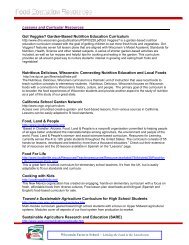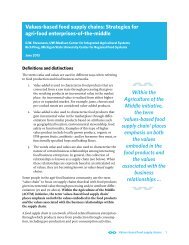Poultry Your Way - Center for Integrated Agricultural Systems ...
Poultry Your Way - Center for Integrated Agricultural Systems ...
Poultry Your Way - Center for Integrated Agricultural Systems ...
Create successful ePaper yourself
Turn your PDF publications into a flip-book with our unique Google optimized e-Paper software.
MANAGEMENT ALTERNATIVES<br />
INDUSTRIAL: CONFINEMENT<br />
Staff training. Training is essential <strong>for</strong> anyone involved in poultry management. Bird injuries and stress occur<br />
when they are improperly handled or when environmental conditions are ignored. Broilers, <strong>for</strong> example, bruise<br />
when improperly handled (catching and containing birds). Proper training, combined with catching in the dark,<br />
can help prevent bruising. The Cali<strong>for</strong>nia <strong>Poultry</strong> Workgroup, in its publication Turkey Care Practices, notes that<br />
the development of a positive attitude is the most important part of training (1998). Moreover, your assigned<br />
service person should help you learn the skills needed to regulate barn temperatures, air flow, and humidity.<br />
When moisture levels are too high, <strong>for</strong> instance, ammonia develops in the litter pack. High concentrations in the<br />
air can cause breast blisters on turkeys or even death from respiratory failure.<br />
All poultry operations must deal with dead birds, which must be removed and recorded each day. Dead birds may<br />
be buried, incinerated, rendered, or composted. There are pros and cons to each. Check with your local zoning<br />
and planning commission to learn about regulations.<br />
Labor. Integrators market contract broiler production as a part-time job. Many growers disagree. A 1999 survey<br />
of more than 1,400 contract broiler producers in ten states suggests that industrial production is more than a<br />
part-time job. However, the number of hours worked depends on the number of broilers produced each year and<br />
on the stage of production. On average, growers with two to four houses (total average of 394,000 birds per year)<br />
reported spending 7.4 hours per day during the brooding period (two weeks after chick delivery) (Schrader and<br />
Wilson, 2001). Daily labor requirements dropped to 5.5 hours per day in the weeks that followed. Additionally,<br />
routine and major cleanouts absorbed a total of 33.3 and 43.3 hours, respectively, and were per<strong>for</strong>med with the<br />
help of some hired labor. Similarly, hatching egg production is a full-time job requiring six to eight hours of work<br />
each day, seven days per week (Cunningham, 2002b).<br />
So, where do the hours go? Regular tasks associated with industrial-style management involve: flock management;<br />
catching and moving birds; building and equipment maintenance; recordkeeping; cleaning out and sanitizing<br />
housing and equipment; and communicating with a service person.<br />
Catching and moving birds. Catching and moving birds require some skill, and is one of the most difficult tasks<br />
producers must per<strong>for</strong>m (Cali<strong>for</strong>nia <strong>Poultry</strong> Workgroup, 1998). Broilers must be caught and moved to crates<br />
by hand. Full-grown turkeys are moved by walking them from the grow-out barn onto trailers. These are large,<br />
temperamental birds that are injured easily if improperly handled.<br />
Maintenance. Housing and equipment maintenance is an<br />
on-going job, even when equipment is fairly new. Preventive<br />
maintenance on ventilation and feeding equipment is essential<br />
and must be done routinely. Growers are encouraged to do<br />
maintenance and repair work themselves, since hiring this<br />
type of work can be expensive and can substantially increase<br />
operation costs (Cunningham, 2002b).<br />
Clean-out. Once your birds are headed to the grow-out house<br />
or processor, clean-out must begin. Growers are responsible<br />
<strong>for</strong> cleaning out, washing, and disinfecting barns as well as<br />
disposing of manure and litter after each batch of birds has<br />
been removed. Manure and litter packs are often removed<br />
with a skid steer loader or other equipment and hauled offsite<br />
<strong>for</strong> biosecurity reasons. Broilers deposit four pounds of<br />
litter per bird over an eight-week period (Mercia, 2001).<br />
Nearly fully grown turkeys on the Bussis farm. At this<br />
stage, Joel can move slowly among the birds to monitor<br />
their condition.<br />
<strong>Poultry</strong> <strong>Your</strong> <strong>Way</strong> 49<br />
MANAGEMENT<br />
ALTERNATIVES



